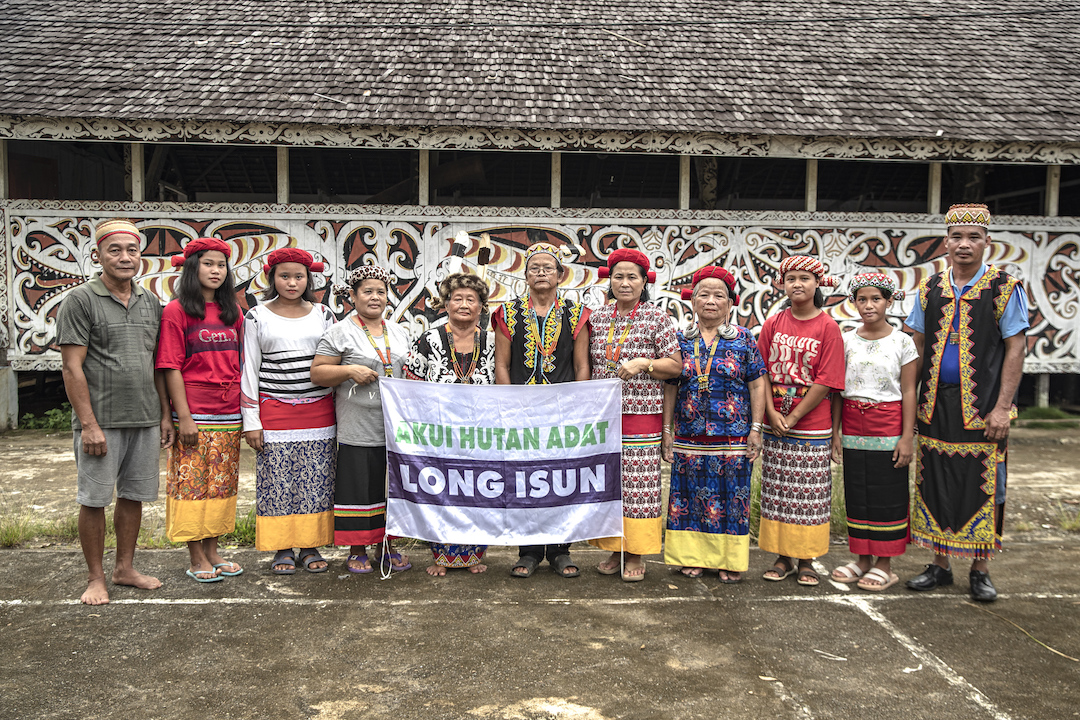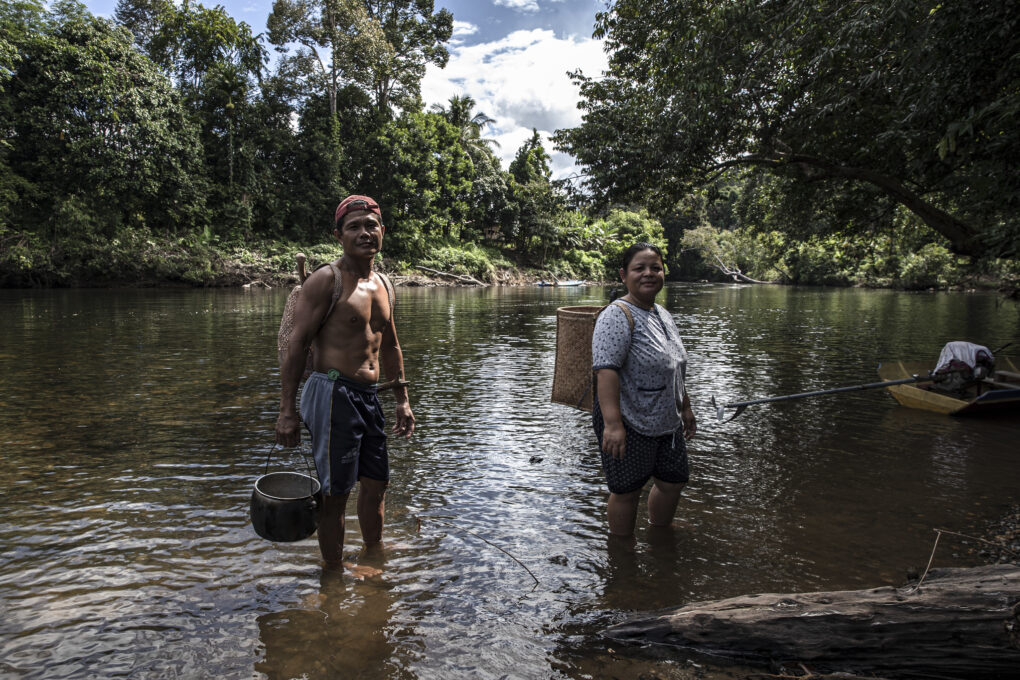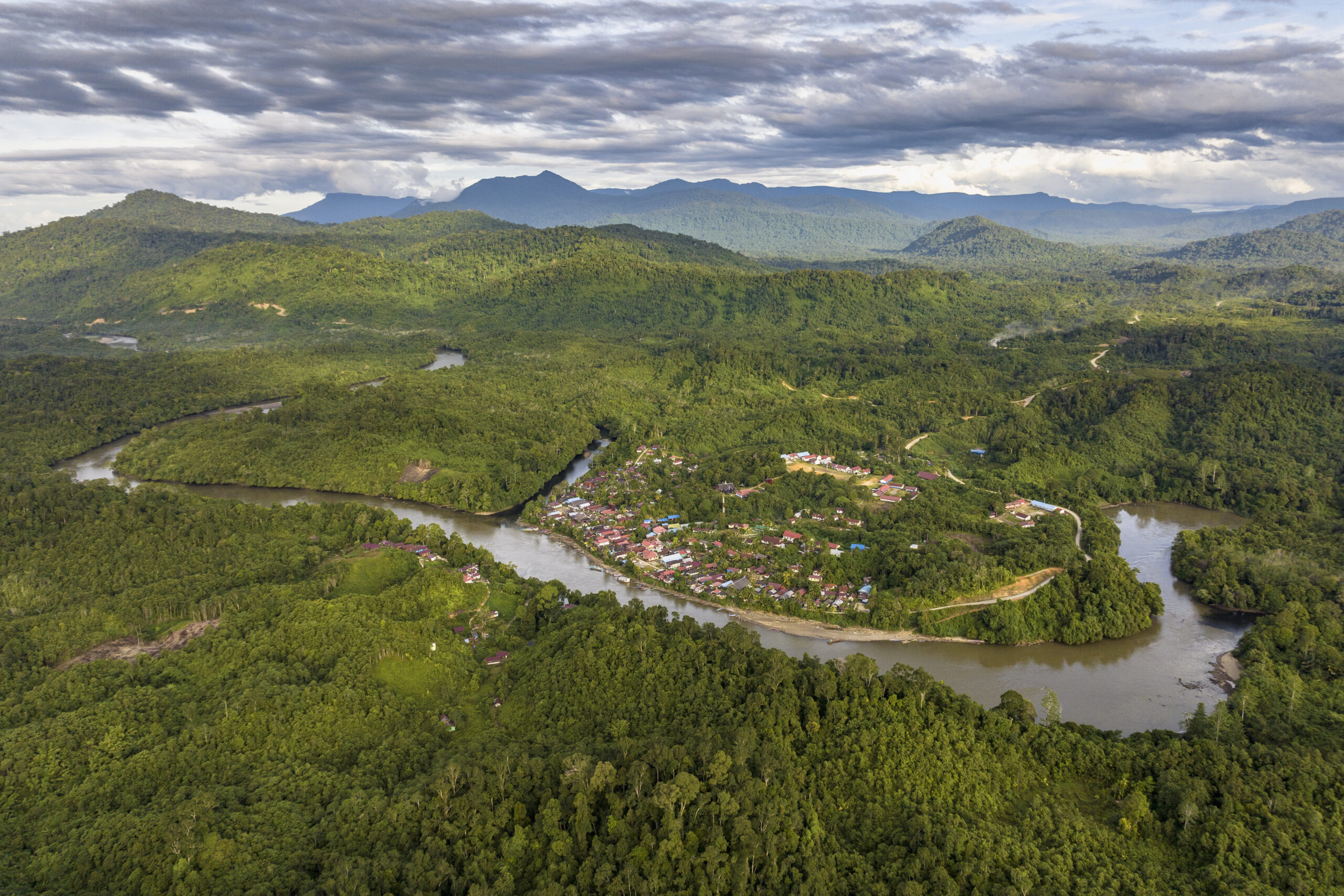Summary
- In September 2024, the Harita Group announced their commitment to permanently cease all logging and commercial activities in the Long Isun community’s Indigenous territories.
- Local civil society groups welcomed the announcement and reiterated the importance of securing legal recognition of Long Isun’s customary forest.
- Major brands must continue to engage with the Harita Group to ensure it upholds its commitment to not operate in Long Isun’s Indigenous territory and until its timber subsidiaries have requested the legal excision of the Long Isun’s customary territory from their concessions.
After years of pressure, the Harita Group issued an updated statement in September 2024 announcing their commitment to permanently cease all logging and commercial activities in the Long Isun community’s Indigenous territories. This important milestone is a testament to the Long Isun community’s decade-long fierce defense of their land, forest, and way of life.
Local civil society groups welcomed the announcement in a press release and reiterated the importance of securing legal recognition of Long Isun’s customary forest. “We welcome Harita Group’s decision to avoid logging in Long Isun territory, but this is just the beginning. We will continue to work alongside the Long Isun community to ensure that this commitment is honored and that no further exploitation of their lands occurs. True sustainability is only possible when Indigenous rights are protected, and Long Isun’s community can get legal recognition on their Indigenous customary forest,” says Martha Doq, Executive Director of Perkumpulan Nurani Perempuan, a Samarinda-based Indigenous-led organization working in partnership with the Long Isun community.
In February 2023, Rainforest Action Network, along with local partners Perkumpulan Nurani Perempuan and other civil society groups in East Kalimantan, Indonesia, called attention to the large swath of customary forests belonging to the Indigenous Dayak Bahau of Long Isun that remain under threat of logging operations by the Indonesian conglomerate Harita Group in the upper catchment of the Mahakam River. The Long Isun community depends on their land and forests for everything. Destroying their forests would mean destroying the community’s livelihood and their way of life.
The two logging companies threatening their territory, PT. Kemakmuran Berkah Timber (PT. KBT) and PT. Roda Mas Timber Kalimantan (PT. RMTK), are under the common control of Indonesian conglomerate Harita Group. For over a decade, the two companies have been criticized for failing to respect the community’s decision to say no to logging and cede the concession areas that overlap with the Long Isun’s Indigenous territory back to the community.
Local environmental justice group Walhi East Kalimantan also emphasized this announcement as an opportunity for the local government to accelerate support for Indigenous rights. “This commitment from the company should encourage proactive action from the local government to accelerate the recognition process of the Long Isun Indigenous community and encourage the central government to immediately designate the Long Isun Indigenous territory as an indicative area for customary forests,” said Fathur Roziqin Fen, Executive Director of Walhi East Kalimantan in the press release.
“While this is a significant milestone, it is just the beginning of a longer journey. Walhi Kaltim remains committed to working alongside the Long Isun community to ensure their rights are fully respected in practice, not just on paper. We will continue to monitor the implementation of this recognition to prevent further encroachment by industries and to ensure that the community retains full control over their lands.”
Community demands beyond paper promises
In 2014, a significant conflict erupted when PT. KBT started to log the customary forests of the Long Isun community without their Free, Prior, and Informed Consent (FPIC). Community leaders made a stand to defend their forests and were faced with intimidation and criminalization. Logging operations on the ground stopped after the conflict escalated in late 2014, and an agreement was reached in 2018, which included a commitment from PT. KBTーone of the two companiesーto a moratorium on logging. The Long Isun indigenous community remains extremely worried that in the future, PT. KBT and/or PT. RMTK will return to log these forests or seek to profit from their concessions through other commercial schemes at the expense of Long Isun’s customary rights. This concern stems from the companies holding government-allocated concessions, giving them the right to log 21,443 hectares of forests within Long Isun community’s territory.
The Long Isun community continued to seek the permanent cancellation of PT. KBT and PT. RMTK’s logging operations within their customary territory while ongoing advocacy continues for the legal recognition of their territory and customary forests, which will protect their lands and forests in the long run.
The community also calls for the Harita Group to support the Long Isun community’s petition for hutan adat, or customary forest title that grants Indigenous communities ownership and management rights over their forests, by requesting government authorities to legally excise areas that overlap within their territory out of PT. KBT and PT. RMTK timber concessions. This request for a concession boundary adjustment could accelerate the legal recognition process as the community’s claim for legal recognition of their customary rights and territory would no longer overlap or be contested by a timber concession.

Harita Group commits to stop all business activities on Long Isun’s Indigenous territory
In response to RAN’s campaign, in October 2023, the Harita Group, via its timber company PT. RMTK, as well as through its palm oil business Bumitama Agri, issued clarifying statements that referred to a previous commitment made by PT. KBT to “suspend logging (maintain the status quo) in the customary rights claimed areas in Long Isun and Naha Aruq.” Because the commitment to a moratorium was a suspension of logging in one concession––not a permanent cancellation of logging in conflicting areas inside both timber concessions––and complexities caused by inaccurate village administrative boundaries for the communities named, this statement was a positive step. Still, it did not offer the peace of mind sought by RAN.
Following further engagement, in September 2024, the Harita Group issued updated statements announcing PT. KBT’s and PT. RMTK’s commitment to “avoid any commercial activity” in Long Isun’s Indigenous territories and that “the area is marked as a no-go zone to avoid the potential for escalating existing land disputes.”
The statement goes on to say, “PT. KBT and PT. RMTK acknowledge that the Long Isun community has refused to give their Free, Prior and Informed Consent (FPIC) to any logging operations” and that the companies have removed the Long Isun Indigenous territory from the timber companies’ future production plan (Rencana Kerja Usaha Pemanfaatan Hasil Hutan Kayu).
The Harita Group timber companies also reaffirmed their commitment to “avoid any commercial activities in the Long Isun village area and the area claimed as the Long Isun customary area that overlaps with the Naha Aruq administrative boundary”. This was important due to the inaccuracy of village administrative boundaries for Naha Aruq, which included parts of the Long Isun community’s territory in the village area designated by the district government.
The public commitments made by PT. KBT, PT. RMTK–– and their beneficiaries in the Harita Group––to respect the customary rights of the Long Isun community and permanently forgo logging in their territory has been welcomed by RAN.
In a landscape where rights violations and land conflicts are the norm, Harita Group’s commitment to cease all business operations on Long Isun’s Indigenous territory in acknowledgment of the community’s decision to say no is a huge milestone for the community and Indigenous rights globally. The commitment addresses some of the decade-long concerns over the company’s intention to operate on Long Isun’s territory in the future.

Unfortunately, the statement falls short of committing the company to engage in a legal process with the Indonesian district and national governments that may ultimately result in the excision of parts of the Long Isun territory from the area covered in its concessions permits.
Indeed, the Indonesian government is the ultimate authority to grant any business permit amendments. Still, permit holders can submit a request (permohonan) to the government to reduce its concession area as outlined in Indonesian Government Regulation No. 23 of 2021 on Forestry Administration (Penyelenggaraan Kehutanan). If the company is serious about ceasing all business operations on Long Isun’s Indigenous territory and supporting the community’s efforts towards legal recognition over their customary forests, sending a letter that requests the government to initiate this process will be critical and can support the acceleration of the community’s legal recognition.
Indigenous rights recognition urgently needed
The Long Isun community has petitioned the government to recognize their Indigenous territory since 2018 as the first step towards securing their customary forest title (Hutan Adat) from the Indonesian government. The title would grant them legal ownership and management rights over their Indigenous territory. The community has waited over five years to get an outcome from the district government of Mahakam Ulu.
Last year, the province of East Kalimantan underwent a spatial plan revision for 2023-2042, which included the conversion of 469,083 hectares of forest areas into other use areas that overlap with hundreds of mining and forestry companies’ concession areas. East Kalimantan will continue to be a high risk sourcing area for companies with No Deforestation, No Peat development, No Exploitation (NDPE) policies. Companies must support accelerating Indigenous rights recognition and land conflict resolution between communities and suppliers with operations in the region to avoid breaching their own policies.

Now is the time for Consumer Brands to take decisive action to Keep Long Isun Forests Standing
Global consumer brands Kao, Procter & Gamble, Mondelēz, Colgate-Palmolive, PepsiCo, and Nestlé have looked the other way by continuing to source from Harita Group’s palm oil company, Bumitama Agri. Several of these brands refused to accept and respond to this grievance due to limitations in their policies and grievance mechanisms which fail to hold their suppliers accountable across the operations of the entire corporate groups they do business with.
In contrast, Unilever accepted the grievance and advocated for change with the Harita Group. Nissin Foods also responded publicly to the grievance stating that “there are no ongoing transactions at present” with Bumitama but it is unclear how the company has engaged Bumitama as there are no disclosures of its current engagement, suspension or no-buy listing.
The public commitment issued by Bumitama, PT. KBT and PT. RMTK shows that the pressure applied by a major palm oil buyer has paid off. Now is the time for all brands to take action.
Brands must engage with the Harita Group to ensure it upholds its commitment to not expand its logging operations into the Long Isun community’s territory. They should continue their engagement until PT. KBT and PT. RMTK have requested the legal excision of the Long Isun’s customary territory from their timber concessions. Brands and the Harita Group, have essential roles in communicating their support for the long-term protection of Long Isun’s forests to national and district governments by accelerating the legal recognition of their territory and right to control and manage their customary forests.
The Dayak Bahau of Long Isun is just one of many Indigenous communities fighting to defend their Indigenous territories and forests from forest-risk commodity production in the Mahakam Ulu landscape. Brands need to keep forests standing in this landscape by ensuring their supply chains and investments are not tied to deforestation and land rights violations now and in the future. Brands can also support the long-term protection of the last intact forests in Borneo by working with governments and their suppliers to establish programs that accelerate legal recognition of Indigenous territories and customary forests in East Kalimantan, beginning in the district of Mahakam Ulu.
We need to do all we can to support Indigenous stewardship of forests to ensure the survival of this precious ecosystem, preserve wildlife habitats, and empower local communities.

